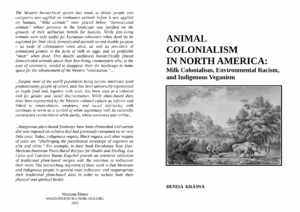
From back cover:
“The Western hierarchical system that tends to divide people into categories was applied on nonhuman animals before it was applied on humans. “Wild animals” were placed below “domesticated animals” whose presence in the landscape was justified on the grounds of their utilitarian benefit for humans. While free-living animals were only useful for European colonizers when dead (to be exploited for their skin), domesticated animals served double purpose – as tools of colonization when alive, as well as providers of animalized protein in the form of milk or eggs, and as profitable “meat” when dead. This double usefulness hierarchically placed domesticated animals above their free-living counterparts who, in the eyes of colonizers, needed to disappear from the landscape to make space for the advancement of the Western “civilization.” ……
Despite most of the world population being lactose intolerant (and predominantly people of color), milk has been universally represented as staple food and, together with meat, has been used as a colonial tool for gender and racial discrimination. While plant-based diets have been represented by the Western colonial culture as inferior and linked to emasculation, weakness, and racial inferiority, milk continues to serve as a symbol of white supremacy with its culturally constructed connection to white purity, whole-someness and virility……
Indigenous plant-based foodways have been diminished and carnist diet was imposed on cultures that had previously consumed no or very little meat. Today, Indigenous vegans, Black vegans, and other vegans of color are “challenging the paradoxical stereotype of veganism as elite and white.” For example, in their book Decolonize Your Diet: Mexican-American Plant-Based Recipes for Health and Healing, Luz Calvo and Catrióna Rueda Esquibel provide an extensive collection of traditional plant-based recipes with the intention to rediscover their roots. The overarching argument of their work is that Mexicans and Indigenous people in general must rediscover and reappropriate their traditional plant-based diets in order to reclaim both their physical and spiritual health.”